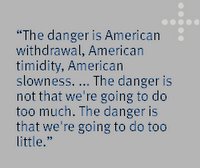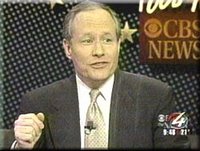 William Kristol, one of the most influential neo-conservative thinkers in Washington and a proponent of what has become known as the Bush Doctrine, is the editor of The Weekly Standard and chairman of The Project for the New American Century.
William Kristol, one of the most influential neo-conservative thinkers in Washington and a proponent of what has become known as the Bush Doctrine, is the editor of The Weekly Standard and chairman of The Project for the New American Century. He has written that the significance of President George W. Bush's State of the Union address in 2002 (the "axis of evil" speech) is too easily forgotten -- that it was a rare moment, "the creation of a new American foreign policy".
He has written that the significance of President George W. Bush's State of the Union address in 2002 (the "axis of evil" speech) is too easily forgotten -- that it was a rare moment, "the creation of a new American foreign policy".On September 11, 2002, as the Bush administration began its sales campaign for the coming war, Kristol suggested that Saddam Hussein could do more harm to the United States than al Qaeda had:
we cannot afford to let Saddam Hussein inflict a worse 9/11 on us in the future.On September 15, 2002, Kristol claimed that inspection and containment could not work with Saddam:
No one believes the inspections can work.Actually, UN inspectors believed they could work. So, too, did about half of congressional Democrats. They were right. On September 18, 2002, Kristol opined that a war in Iraq
could have terrifically good effects throughout the Middle East.On September 19, 2002, Kristol once again pooh-poohed inspections:
We should not fool ourselves by believing that inspections could make any difference at all.During a debate with David Corn on Fox News Channel, after Corn noted that the goal of inspections was to prevent Saddam from reaching "the finish line" in developing nuclear weapons, Kristol exclaimed,
He's past that finish line. He's past the finish line.On November 21, 2002, Kristol maintained,
. . . we can remove Saddam because that could start a chain reaction in the Arab world that would be very healthy.
 The Republicans in the Senate called the likes of William Kristol to testify before their Foreign Relations Committee. What's Next in the War on Terrorism?(7-Feb-02):
The Republicans in the Senate called the likes of William Kristol to testify before their Foreign Relations Committee. What's Next in the War on Terrorism?(7-Feb-02):The larger question with respect to Iraq, as with Afghanistan, is what happens after the combat is concluded. [...] And, as in Kabul but also as in the Kurdish and Shi'ite regions of Iraq in 1991, American and alliance forces will be welcomed in Baghdad as liberators. Indeed, reconstructing Iraq may prove to be a less difficult task than the challenge of building a viable state in Afghanistan.Weekly Standard(April 28, 2003):
The political, strategic and moral rewards would also be even greater. A friendly, free, and oil-producing Iraq would leave Iran isolated and Syria cowed; the Palestinians more willing to negotiate seriously with Israel; and Saudi Arabia with less leverage over policymakers here and in Europe. Removing Saddam Hussein and his henchmen from power presents a genuine opportunity -- one President Bush sees clearly -- to transform the political landscape of the Middle East.
The United States committed itself to defeating terror around the world. We committed ourselves to reshaping the Middle East, so the region would no longer be a hotbed of terrorism, extremism, anti-Americanism, and weapons of mass destruction. The first two battles of this new era are now over. The battles of Afghanistan and Iraq have been won decisively and honorably. But these are only two battles. We are only at the end of the beginning in the war on terror and terrorist states.On February 20, 2003, Kristol summed up the argument for war against Saddam:
He's got weapons of mass destruction. At some point he will use them or give them to a terrorist group to use...Look, if we free the people of Iraq we will be respected in the Arab world....France and Germany don't have the courage to face up to the situation. That's too bad. Most of Europe is with us. And I think we will be respected around the world for helping the people of Iraq to be liberated.On March 1, 2003, Kristol dismissed concerns that sectarian conflict might arise following a US invasion of Iraq:
We talk here about Shiites and Sunnis as if they've never lived together. Most Arab countries have Shiites and Sunnis, and a lot of them live perfectly well together.He also said,
Very few wars in American history were prepared better or more thoroughly than this one by this president.And Kristol maintained that the war would be a bargain at $100 to $200 billion. The running tab is now nearing half a trillion dollars. On March 5, 2003, Kristol said,
I think we'll be vindicated when we discover the weapons of mass destruction and when we liberate the people of Iraq.Then on NPR, on (April Fools' Day, 2003), he uttered the words that Al Franken never gets tired of playing:
There's been a certain amount of pop sociology in America ... that the Shia can't get along with the Sunni and the Shia in Iraq just want to establish some kind of Islamic fundamentalist regime. There's almost no evidence of that at all. Iraq's always been very secular.

No comments:
Post a Comment